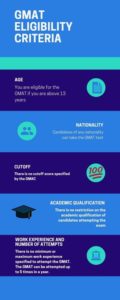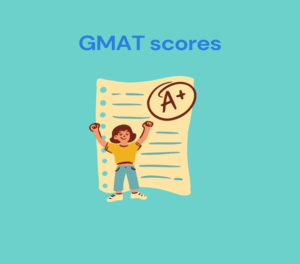The GMAT exam full form is — Graduate Management Admission Test. This is a standardised entrance test that’s taken by students who want to pursue an MBA degree. Conducted by the Graduate Management Admission Council (GMAC), this test is held all throughout the year and is attempted by thousands of students.
GMAT is a computer-adaptive, which means that the difficulty level of the test alters in real-time as per your ability to answer each section. To put it simply, your performance in the previous section determines the difficulty level of your next section. This exam has four sections — Analytical Writing Assessment, Quantitative Reasoning, Verbal Reasoning and Integrated Reasoning. The questions in these sections are designed to test your logical reasoning, critical thinking, problem-solving and logical reasoning skills. Each of these sections have quite a vast syllabus, hence, it’s imperative to study the topics thoroughly and prepare well to get your desired scores.
Below, you will find some more general information about the GMAT exam. So read on!
| Table of Contents |
| Who is eligible to take the GMAT exam? |
| When can you take the GMAT exam? |
| Where can you take the GMAT exam? |
| What is the exam fee for GMAT? |
| What is the registration process? |
| What are the different sections of the GMAT exam? |
| GMAT scores |
| How to prepare for GMAT? |
| FAQs |
Who is Eligible to Take the GMAT Exam?

GMAC hasn’t laid down any limitations for taking the exam, however, business schools do have certain criteria that need to be fulfilled if you plan on taking the exam. Let’s take a look at a few of them below.
Age – You are eligible for the GMAT if you are over 13 years of age. There is no upper age limit for the GMAT. However, if you are between the ages of 13 and 17, you need to submit a consent letter from a parent or legal guardian.
Nationality – Candidates of any nationality can take the GMAT. However, you need to have a valid ID proof. Do note that ID proof requirements might differ from country to country. So, make sure you check what ID proofs are needed before registering for the exam.
Cut off – There is no cut-off score laid down by GMAC. However, business schools that you apply to might have cut off scores. Hence, check all details before submitting your application to the graduate school of your choice.
Academic qualification – While there is no restriction on the minimum or maximum academic qualification for attempting the GMAT, it is assumed that candidates taking the exam have either completed their undergraduate degrees or are in the final year.
Work experience – There is no maximum or minimum work experience required to attempt the GMAT. However, it is necessary to keep in mind that all B-school admission committees value and prefer candidates who have some work experience.
Number of attempts – You can attempt the exam up to 5 times in a calendar year. However, you are allowed to take the GMAT exam once every 16 days after your previous attempt. Besides, you are allowed to attempt the GMAT 8 times in a lifetime. And, if you happen to get a perfect score of 800, you have to wait at least five years before you retake the exam.
When Can You Take the GMAT Exam?
The GMAT exam can be attempted throughout the year. However, while selecting your GMAT exam date you have to keep in mind the admission deadlines for the B-schools you are applying to.
Other factors to consider before finalising your GMAT exam date are the time needed to prepare your supporting documents like SOP (Statement of Purpose), LOR (Letters of Recommendation), essays, CV, the time required to prepare yourself for retakes and schedule them (if necessary). You must also take into consideration which round of MBA admissions you are applying for — the fall admissions or the spring semester admissions. All of the above-mentioned elements play an important role in determining when to attempt the GMAT exam.
It is recommended that you commence your preparation efforts at least 8 – 10 months before the application deadlines at the university. This will give you sufficient time for preparation, reattempts, writing essays, LORs, resume, etc.
GMAT Quant Sample Questions and Answers
GMAT Verbal Sample Questions and Answers
Where Can You Take the GMAT Exam?
You can take the GMAT at registered test centres in the city or a nearby city if there are no test centres present where you live. There are over 39 GMAT test centres spread across 34 cities in India. To view a more detailed list of the test centres available in or near your city, you can visit the official website of GMAT and click on “Find a Test centre”.
Before you choose the GMAT centre, here are some of the points to remember:
- Proximity – Check if the centre is close to your home so that you have no issues commuting or finding your way to the exam centre.
- Accessibility- the exam centre must be in an easily accessible area and you must be able to reach there quickly.
- Check reviews about the test centre and administration (you can check this on GMAT Club, which is a forum specifically for individuals attempting GMAT)
- Check about the facilities available at the GMAT test centre (for example — separate workstations, lockers for storing personal belongings, erasable markers, notepads etc).
In light of the COVID-19 pandemic, GMAC (the Graduate Management Admission Council) is also offering a GMAT Online Exam called an “interim, proctored exam”. You can take this exam from the comfort of your home on your computer.
What is the Exam Fee for GMAT?

The GMAT exam fee is USD 250 in India, which is roughly INR 18,500. Also, the fee is the same for the online exam as well. In addition to this, there are a few additional services such as enhanced score reports, rescoring, and cancellations or rescheduling that you are charged for separately.
Below is a detailed list of the fee details for these services:
| GMAT Services | Fees |
| GMAT Registration fee | US $250 |
| Rescoring for AWA essay | US $45 |
| Additional Score report | US $35 |
| Score cancellation report (after you leave test centre) | US $25 |
Cancellation fee*
|
|
| Reinstate score | US $50 |
| Enhanced score report | US $30 |
What is the Registration Process for the GMAT?
The registration process for the GMAT is fairly straightforward. Below is a step-by-step guide on how to register for the exam.
- First, you have to visit mba.com to create your account. Alternatively, you can call GMAT customer service of your region to create an account.
- The next step is to enter your basic information like the first name, last name, nationality, address, gender, date of birth, password, email address and contact number.
- Then proceed to create your account.
- Now you have to schedule your exam by selecting the date, test centre, and time slot of your preference. You have the option to select up to 3 centres, check for availability of slots/seats and select accordingly.
- Next, you have to confirm your exam details and preferences.
- The final step is to make a payment of US $250. The GMAT exam payment can be made using a credit card or debit card. Finally, click on complete your order. Your GMAT registration process is complete.
- You will receive an email confirmation with all your registration details.
What are the Different Sections of the GMAT?
The GMAT exam comprises of four important sections:
- Quantitative Reasoning
- Verbal Reasoning
- Analytical Writing Assessment
- Integrated Reasoning
The score ranges, types of questions, and duration for these sections are given in the table below:
| Sections | Duration | Score Range | Types of Questions |
| Integrated Reasoning | 30 minutes | 1 to 8 | Multi-source Reasoning, Two-Part Analysis, Table Analysis and Graphics Interpretation |
| Analytical Writing | 30 minutes | 0 to 6 | Analysis of an Argument |
| Verbal Reasoning | 65 minutes | 0 to 60 | Reading Comprehension, Sentence Correction and Critical Reasoning |
| Quantitative Reasoning | 62 minutes | 0 to 60 | Data Sufficiency, Problem Solving |
| Total | 3 hours 30 minutes ( inclusive of 2 optional 8-minute breaks) | 200 – 800 |
We have also listed down the topics for these sections to assist you further.
Quantitative Reasoning syllabus – The Quantitative section tests your ability to solve mathematics problems and interpret graphic data. Following is a summary of some of the topics covered in this section :
- Arithmetic
- Geometry
- Properties of Integers
- Exponents and Roots
- Linear Equations
- Ratio Proportions
- Elementary Algebra
- Permutation and Combinations
Verbal Reasoning syllabus – This section measures your ability to read and understand written material, evaluate the arguments and communicate your thoughts logically in the English language. Below are some of the topics you have to learn in this section :
- Articles
- Phrases and Clauses
- Active to Passive
- Verb Tense
- Parts of speech
- Direct and Indirect
- Pronoun Agreement
- Modifiers
- Basic Sentence structure: Adjectives, Nouns, Pronouns
- Idioms & Idiomatic Expressions
- Parallelism
- Subject-Verb Agreement
Analytical Writing syllabus- This section has one essay type question — “Analyse an Argument”. Here you have to analyse the argument given and then write a critique. This section tests your critical thinking and communication skills.
Integrated Reasoning syllabus – Measures how you integrate data to solve difficult problems. This section has four types of questions.
- Table Analysis – Here you have to interpret data that is presented in a table format. From the answer choices given, you have to choose the statement that best explains the data given.
- Graphics Interpretation – Here you have to analyse the information given in the form of graphs, statistical curve distribution, confidence level graphs, pie charts, box plots, bar charts, etc. You are to choose the correct answer from the choices given.
- Multi-source Reasoning – Here you are expected to interpret data given in the form of charts, graphs or tables. For some questions, you might have to determine whether the data provided is relevant to answer your question and for some, you might have to check for discrepancies and draw conclusions.
- Two-Part Analysis – Here questions are designed to measure how well you can solve complex problems. The questions asked in this section could be verbal or quantitative or a combination of the two.
Now that you are aware of the sections, you should know that you are free to choose the order in which you want to attempt these sections in the exam. The three options are as follows:
- Quantitative Reasoning, Verbal Reasoning, Integrated Reasoning, Analytical Writing Assessment
- Verbal Reasoning, Quantitative Reasoning, Integrated Reasoning, Analytical Writing Assessment
- Analytical Writing Assessment, Integrated Reasoning, Quantitative Reasoning, Verbal Reasoning
GMAT Scores

The GMAT is scored within a range of 200-800. Any score above 700 is considered a good GMAT score. 800 being the best. However, the cut-off score varies according to the specialisation and B-school to which you are applying to. For more competitive programs at the best-ranked schools, the score cut off would be much higher since the number of applicants for such programs will be significantly more.
The GMAT score is considered important because it reveals if a candidate is capable of doing well in the business program. Let’s look at what is considered an excellent score, a good score and an above-average score in the tables below.
- Excellent GMAT scores:
| Quantitative Score | Above 51 |
| Verbal Score | Above 40 |
| Integrated Reasoning | 8 |
| Analytical Writing | 6 |
| TOTAL SCORE: | 710 – 800 |
- Good GMAT scores :
| Quantitative Score | 48- 50 |
| Verbal Score | 35 – 39 |
| Integrated Reasoning | 7 |
| Analytical Writing | 5.5 |
| TOTAL SCORE: | 650 – 700 |
- Above Average GMAT scores :
| Quantitative Score | 38-47 |
| Verbal Score | 28 – 34 |
| Integrated Reasoning | 5 to 6 |
| Analytical Writing | 4.5 to 5 |
| TOTAL SCORE: | 550 – 640 |
*This is just to give you a basic idea, these scores can vary.
Of course, a good GMAT score alone won’t guarantee admissions but it is crucial to help your profile get noticed by the admissions committee. The other criteria for admissions include a stellar SOP, exemplary recommendations or LOR, an impressive CV and any additional certifications or extracurricular achievements that you might have.
How to Prepare for the GMAT Exam?
There are several strategies that you need to consider while preparing for the GMAT. We have listed a few key tips to assist you with your GMAT preparation journey.
- First and foremost, prepare a study plan based on your convenience, on your strengths and weaknesses and more.
- Select appropriate study materials. While there is an abundance of materials available on the internet, not all of them are from credible sources. Therefore, it is essential that you check verified sources like the official GMAT website for Official Guides or the GMAT syllabus. These guides/syllabuses are also available in paper books.
- Next start solving sample practice questions, since these questions have previously appeared in the exam, you’ll be acquainted with the different difficulty levels of the questions, the pattern of the exam and more.
- Attempt GMAT mock tests. You can download solved mock test pdfs from trustworthy sources. On doing so, you will familiarize yourself with the pattern of the exam, you will also understand where your strengths and weaknesses lie and you will learn how to manage your time. More so, if you solve mock tests, you get an estimate of the score you are likely to achieve in the exam with your knowledge. Once you get a rough idea of that, you can accordingly alter your preparation to help you reach your target score.
So before you plan to take up this exam, make sure to know all about the GMAT — from the GMAT full form to each section, the scoring range to eligibility criteria and more. Once you are aware of the exam, start preparing; make sure to keep the above-mentioned tips in mind while starting your preparation. Above all, remember to pick a date wisely and create a plan that will help you complete your preparations for the exam comfortably and on time.
FAQs
1. What is the meaning of the GMAT?
Graduate Management Admission Test.
2. Why take the GMAT Test?
The GMAT exam acts as a gateway for you to gain admissions to MBA programs at prestigious B-schools around the world. Once you get an MBA degree, various job opportunities come up your way.
3. What is the scope of GMAT scores in India?
Many B-schools in India also accept the GMAT scores as a part of their admissions process. It is recommended that you do thorough research of the admission procedure and requirements before you apply to these b-schools.
4. How difficult is the GMAT exam?
While it might be considered tough due to its adaptive nature, timed format and vast syllabus, etc., the exam is easy to crack, provided you have prepared well for it.
5. How can I prepare for the GMAT at home?
There are a plethora of options available online to help you with your GMAT preparation. If you plan to study by yourself, then make sure to study from authentic and credible sources. You can also get yourself good GMAT books. In fact, the official website has numerous study materials for you. They are free as well as paid materials. You can get them as per your need. Another thing that you can do is sign up for GMAT coaching classes that suit your requirements. CareerLabs is a great place to enrol for your coaching.
All the best!










Talk to an expert?